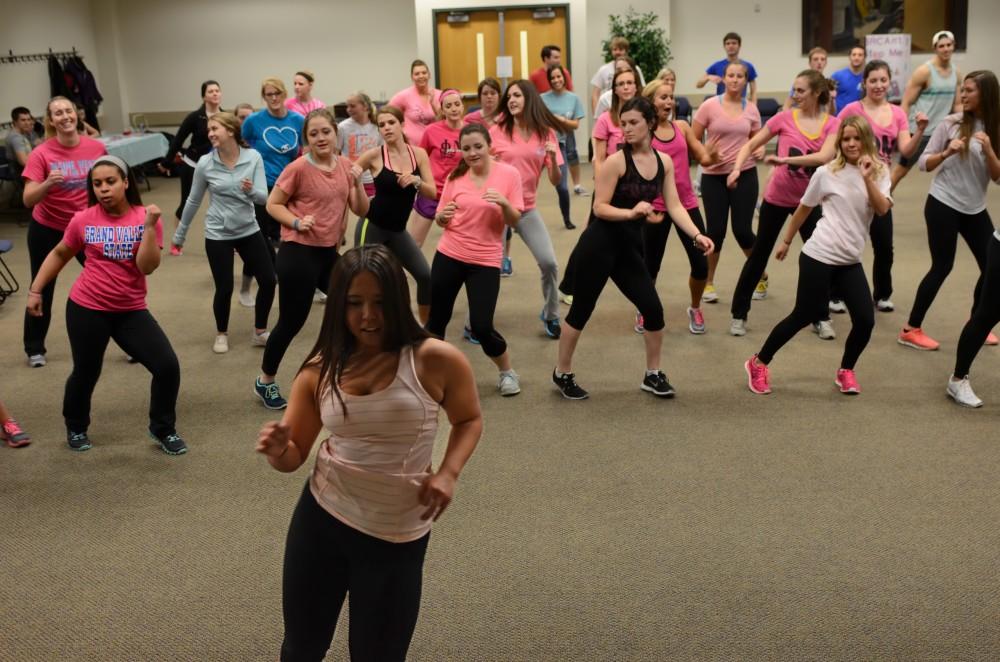Gene mutation increases risk of cancer

GVL/Kevin Sielaff After a series of discussions, the group took part in a few rounds of Zumba at Zumba for a Cure, which took place this past Tuesday in Kirkoff’s Pere Marquette room.
Apr 2, 2014
“My name is Kelly and I’m a mutant,” said Kelly Roth, a 20-year-old student at Eastern Michigan University.
No, she didn’t mean the green scary kind of mutant that may live at the bottom of Loch Ness; she’s talking about the mutated BRCA gene. After her 18th birthday, she found out she has it.
On Tuesday, the Grand River Room of the Kirkhof Center was turned into a fitness room when BRCAn’t Stop Me, Phi Mu and Delta Upsilon came together to host Zumba for a Cure.
BRCAn’t Stop Me president and event coordinator Mollie Smith said the event was put on to raise money for hereditary cancer research and spread awareness about the BRCA gene mutation.
“The reason that we did this event is because there are so many women and men on campus who don’t know that they have the BRCA mutation,” Smith said. “If you do have this mutation, you have an 85 percent chance of developing breast cancer if you’re a woman and an increased chance of prostate cancer as a male.”
Roth, a guest speaker at the event, told the story about how her mother and her aunt both died at a young age from breast cancer. Seeing how cancer affected her family led her to make the controversial decision to be the youngest woman to get a prophylactic bilateral mastectomy, a surgery where both of her breasts will be removed in hopes of preventing cancer.
“I’ve never been afraid of dying. I’m not even afraid of getting cancer, but I am afraid of what it would do to my family,” Roth said.
She added that when her aunt and her mother were diagnosed, testing for the BRCA gene mutation wasn’t something that people did, leading Roth’s mother to believe that her own actions lead to her cancer.
“One of the things that I wish I could’ve told my mother is that it wasn’t her fault,” Roth said.
Smith said the whole idea of the student organization BRCAn’t Stop Me is to spread awareness about all aspects of the BRCA gene. The organization has only been on campus since last fall, but it’s already making a name for itself.
Smith said the organization has partnered with the national organization Facing Our Risk of Cancer Empowered. FORCE is a national nonprofit that works to improve the lives of families that have been affected by hereditary cancers.
One of the ways that families deal with hereditary cancers is by taking preventative measures.
“I hope that people will learn that exercise is important because by exercising you reduce your risk of cancer,” Smith said.
To teach students more about the BRCA gene mutation and preventative measures, the event featured four guest speakers. Smith said she hopes the combination of Zumba and guest speakers will help reiterate the point that exercise can help prevent cancer.
One of the guest speakers was a Grand Valley State University professor, Natalia Gomez. Gomez was diagnosed with breast cancer in November 2012, and a month later, she tested positive for the BRCA gene mutation. Since then, she has undergone five separate surgeries and radiation therapy, and now she is in recovery.
Gomez said she has talked about her battle with cancer behind the scenes, but this was the first time she spoke up about it in the GVSU community. This event, Gomez said, was as much for the audience as it was for her.
“You’re helping me to break something that I needed to,” Gomez said. “I needed to say that it’s OK that I had breast cancer. It’s OK to say that I’m a fighter, but I’m also scared to death, and that’s OK.”
This semester is Gomez’s first full-time schedule back since her diagnosis and treatment.





















